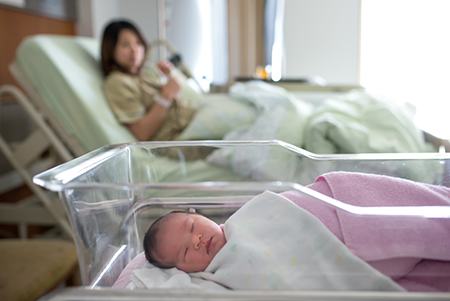 You’ve registered for the baby essentials and read about what to expect with a newborn. Now, you’re counting the weeks until you bring baby home. But it’s important to know what to expect in the hospital immediately after delivery too.
You’ve registered for the baby essentials and read about what to expect with a newborn. Now, you’re counting the weeks until you bring baby home. But it’s important to know what to expect in the hospital immediately after delivery too.
During the hours following birth, your medical team will care for your baby’s health and yours in many ways. These first moments are also a special time for mom and baby to bond and get off to a healthy start. Here are a few things you can expect right after your baby arrives.
What to expect for mom
Immediately after delivery, your care team will monitor you in several ways—such as blood pressure and heart rate—to make sure you’re recovering well. If you had an epidural, it may take a couple of hours for the effects to begin to fade.
After a vaginal delivery, you may have a tear or cut in the area between your vagina and anus, known as the perineum. If needed, your OB GYN may use dissolvable stitches following the birth to help this area heal in the coming weeks. Your care team will help you learn to care for your perineum, including rinsing with water, ice packs, and other methods to help ease pain.
If you had a cesarean delivery, your OB GYN may close your incision using stitches, strips, staples, or glue. Your incision will be sore, puffy, and pink. Your care team will teach you how to care for your incision, and your OB GYN can prescribe medicine to help manage your pain.
Whether you had a vaginal or cesarean delivery, you can expect bleeding and vaginal discharge, known as lochia. Many new moms also have sharp pains in their abdomen after birth. The American Academy of Family Physicians says these “afterpains” are a part of your uterus starting to shrink back to its normal size.
It’s also common to have swelling or water retention. Especially if you had an epidural, anesthesia, or other pain medication, constipation may be a concern. Talk to your OB GYN about taking stool softeners after birth to help make going to the bathroom easier.
What to expect for baby
In the minutes following birth, your care team will assess your baby’s health on several factors—called the Apgar test. These typically include breathing, skin color, reflexes, heart rate, and muscle tone. Your baby’s nurse will likely weigh and measure your baby and gently clean him or her.
If he or she doesn’t need any extra care, skin-to-skin time is encouraged immediately after your baby is born. This means your baby—typically only wearing a diaper—lays directly on your chest.
The La Leche League says this practice has numerous benefits for you and your baby, such as promoting breastfeeding and bonding, regulating your newborn’s body temperature and heart rate, reducing crying, reducing your stress level, and much more.
While you’re in the hospital, you’ll also be offered several preventive tests and procedures for your newborn. The American Academy of Pediatrics recommends these routine procedures to help protect your baby’s health.
They include eye drops to prevent eye infection, a test to measure oxygen in the blood, a vitamin K injection, a Hepatitis B vaccine, and a hearing screening. All states also require a blood test using a heel stick to screen for numerous metabolic disorders.
A smooth transition home
Welcoming your baby comes with a mixture of emotions. You may feel joy, exhaustion, anxiety, and more. And caring for a newborn often requires a little help.
If your baby is doing well, you’re encouraged to keep him or her with you in your room as much as possible. This not only helps you bond with your baby but also gives you valuable time to adjust to caring for a newborn while your medical team is nearby.
If you have any concerns about your health or the health of your baby, these first days after birth are the perfect time to talk with your OB GYN or other health care team members. With their help, you can get the initial healing and bonding time you need and feel confident as you bring baby home.
